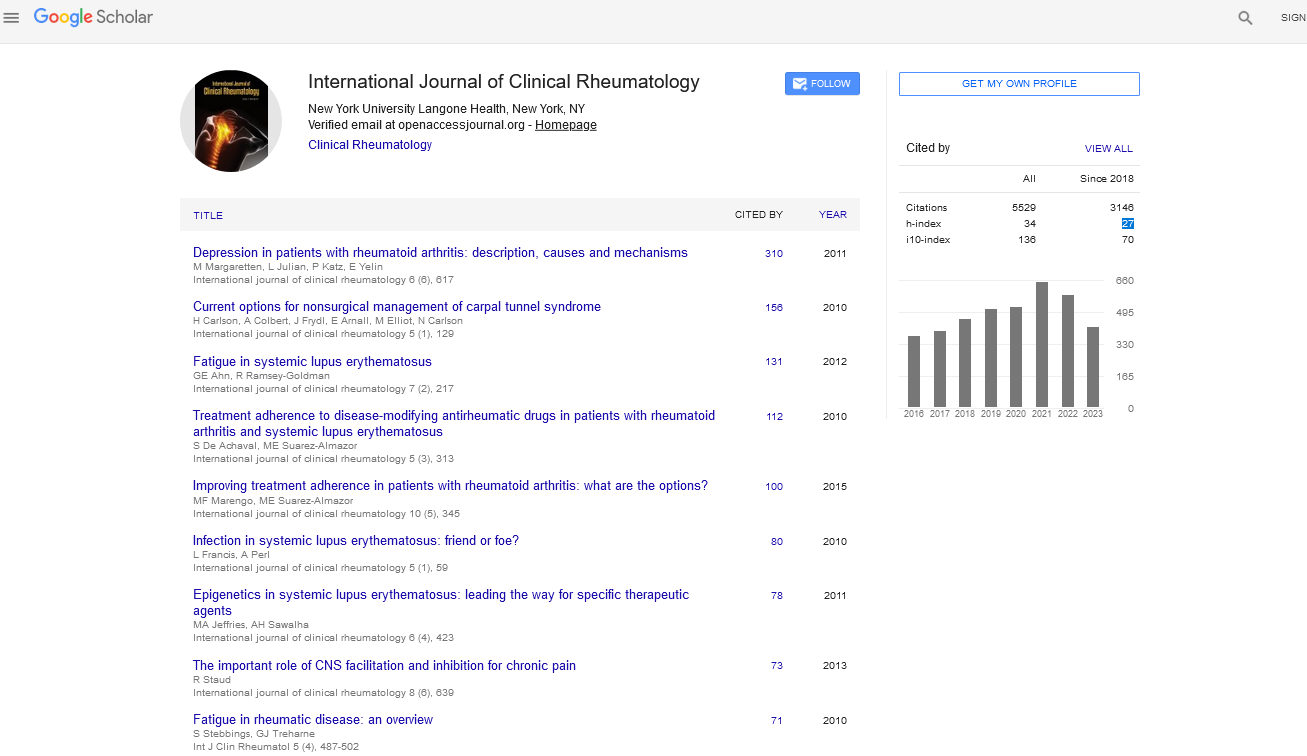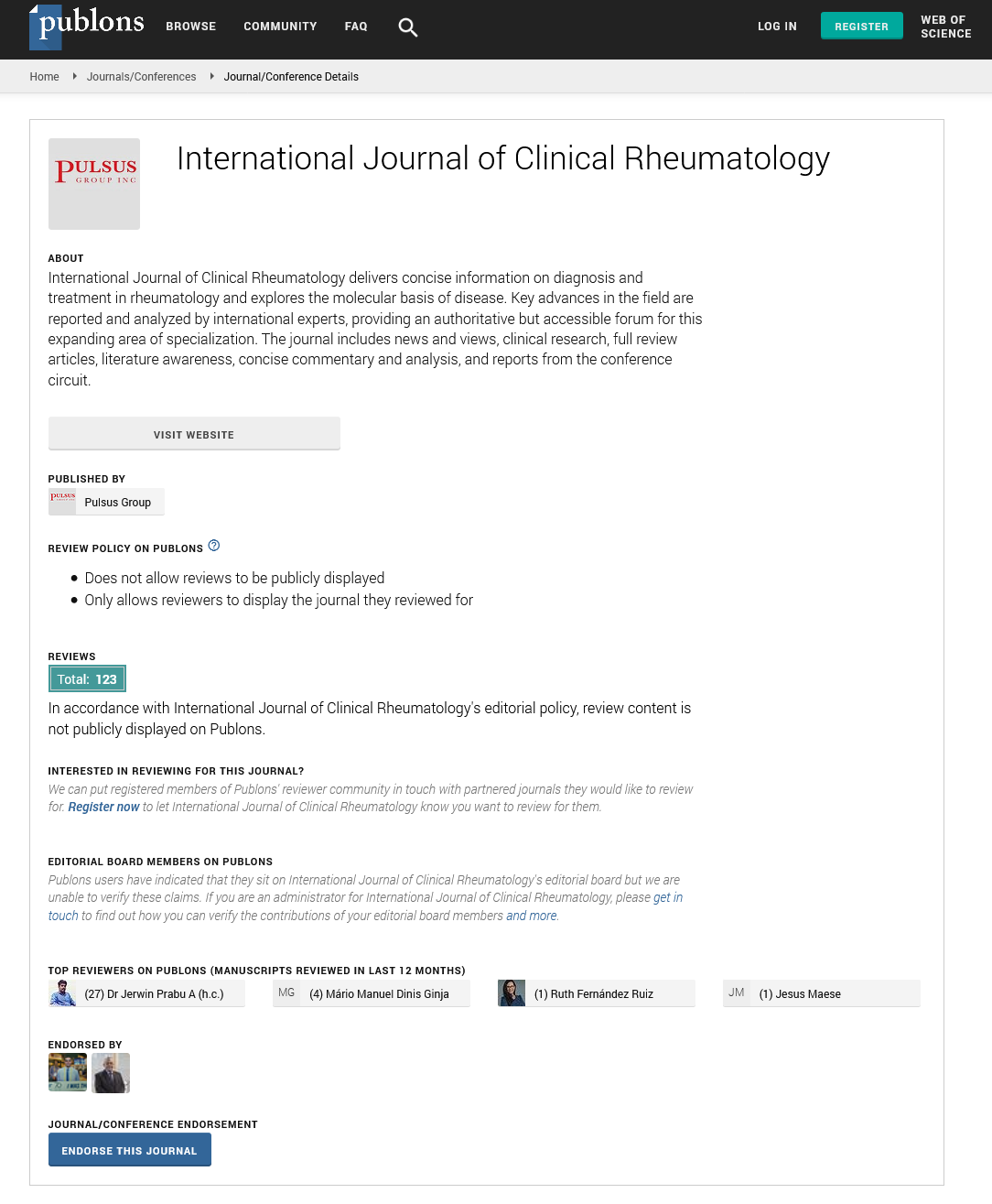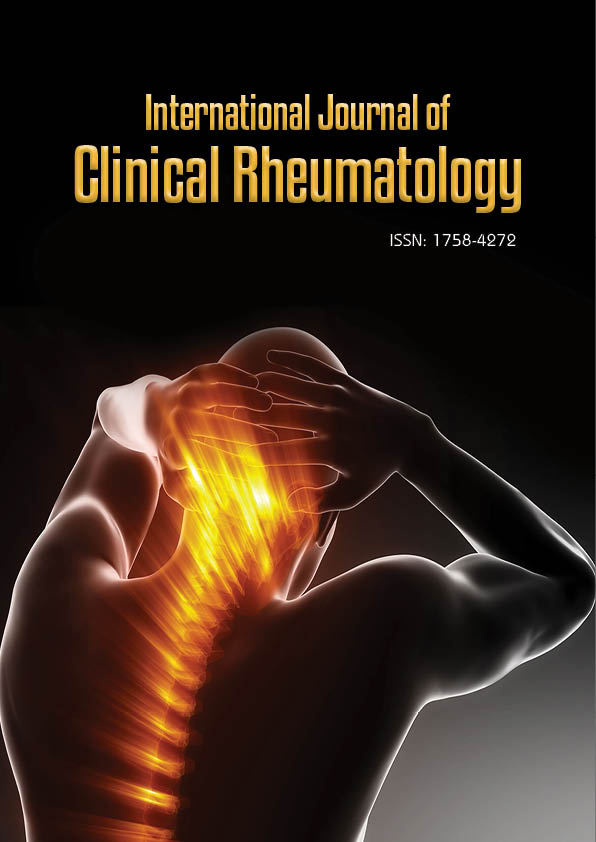Opinion Article - International Journal of Clinical Rheumatology (2020)
Steroid Injections & COVID-19: Are Specialists Justified in Defying the Guidelines?
- Corresponding Author:
- Hasan Tahir
Division of Medicine
University College London, London, UK
E-mail: hasan.tahir@nhs.net
Abstract
The COVID-19 pandemic, caused by the novel SARS-CoV-2 virus, has led to the development of new guidelines for managing patients who need Corticosteroid Injections (CSI) as part of their musculoskeletal conditions or symptom management. Guidelines on the use of CSI have been published by the World Health Organisation (WHO) [1] as well many professional bodies overseeing their independent health disciplines including Anaesthetics, Rheumatology, General Practitioners, Orthopaedics, Sports Physicians [2] and Physiotherapists [3]. These guidelines generally have been interpreted as discouraging the administration of CSI, with WHO guidance for patients with COVID-19 being to completely avoid systemic corticosteroids [3]. However, the evidence these recommendations have been made on is unclear.
WHO reports that there is evidence that the use of steroids is linked to increased mortality and delayed viral clearance as previously seen in those affected by Middle East Respiratory Syndrome coronavirus (MERSCoV) [3]. However, retrospective reviews of data on previous coronavirus outbreaks, such as severe acute respiratory syndrome coronavirus (SARS-CoV) and MERS-CoV, found no fatalities reported in patients at any age who were on immunosuppressive treatments [4]. A study conducted on SARS patients in China found that the proper use of corticosteroids resulted in reduced mortality and shorter hospitalisation stay [5]. Global evidence of SARS-CoV-2 thus far suggests that immunosuppressed patients are not at an increased risk of severe complications compared with the general population [4].
Steroids play an important role across a range of conditions. In musculoskeletal disease management, steroids can be used to reduce inflammatory joint disease, thus easing pain, increasing mobility and providing improved quality of life. For some musculoskeletal conditions, especially in the acute situation, there are no effective alternative management options aside from steroid injections. To offer surgical treatment early is not always the best practice and it is unlikely that this will be offered to patients in the near future given how the pandemic has impacted the surgical healthcare system. Given the lack of evidence of their harm in patients with COVID-19, suspending steroids, including injections, can cause significant morbidity as it will leave patients' conditions and symptoms unmanaged.
The pathophysiology of severe COVID-19 infection involves the formation of a 'cytokine storm' leading to a state of hyperinflammation due to the release of proinflammatory cytokines [6] which causes tissue and multi-organ damage. Therefore, it has been hypothesised that the use of immunosuppressive agents, such as steroids, can attenuate the cytokine storm and improve clinical outcomes in COVID-19 patients [6], such as reduced mortality and intensive care admissions.
There is novel evidence from the national RECOVERY ((Randomised Evaluation of COVid-19 thERapY) trial, based in the United Kingdom, to suggest that the use of dexamethasone reduces mortality. With deaths reduced by one-third in ventilated patients and one-fifth in other patients receiving oxygen only [7], this is the first drug to show significant therapeutic benefits in those infected with COVID-19.
We conducted an international survey to understand specialists' practices of steroid injections during the COVID-19 pandemic. 73 specialists, consisting of Rheumatologists, Orthopaedic Surgeons, Pain Specialists, Sports and Physiotherapists and General Practitioners, practising across 6 countries (United Kingdom, Pakistan, United Arab Emirates, Saudi Arabia, United States and Singapore) completed the survey. Most specialists (58.9% (n=43/73)) continued to administer steroid injections. 98.6% specialists were not aware of any of their patients developing COVID-19 within a week of CSI administration. Of those patients who did develop COVID-19 at some point after their CSI (14/73 [19.2%]), none required hospitalisation.
In-keeping with the survey results, we do not believe there to be a reason to discontinue the administration of CSI in patients requiring them for symptom or disease control. In some cases the risk of suspending the use of a CSI is unjust and may outweigh the so far unproven risk as quality of life may be being denied.
Other countries have also started to reassess the appropriateness of these guidelines surrounding the use of corticosteroids in SARS-CoV-2. The Chinese Thoracic Society have issued an expert consensus statement and have adopted the basic principles of ensuring benefit and harm is carefully weighed before using corticosteroids and are steering away from the immediate decision to suspend, or to not consider the use of corticosteroids [8].
We recommend the continuation of the use of CSI in those requiring it and a revision of current guidelines during the COVID-19 pandemic. We believe a shared risk-assessment consultation should be held with the patient in which both the patient and clinician discuss the risks and benefits and decide upon a common treatment approach.
Declaration of interests
There are no conflicts of interests.
Funding
No funding was received for this article.
Conflicts of interest/Competing interests
No conflicts of interest to report.
References
- https://www.who.int/docs/default- source/coronaviruse/clinical-management-of-novel-cov.pdf
- https://blogs.bmj.com/bjsm/2020/03/21/nsaids-and-corticosteroid-injections-during-the-covid-pandemic-what-sport-and-exercise-medicine-physicians-and-sports-physios-should-know
- https://acpomit.csp.org.uk/content/covid-19-injection-therapy
- D’Antiga L. Coronaviruses and immunosuppressed patients: The facts during the third epidemic. Liver. Transpl. 26(6), 832–834 (2020).
- Chen RC, Tang XP, Tan SY et al. Treatment of severe acute respiratory syndrome with glucosteroids: the Guangzhou experience. Chest. 129(6), 1441–1452 (2006).
- Spezzani V, Piunno A, Iselin HU. Benign COVID-19 in an immunocompromised cancer patient-the case of a married couple. Swiss. Med. Wkly. 150(1516) (2020).
- https://www.recoverytrial.net/files/recovery_dexamethasone_statement_160620_final.pdf
- Shang L, Zhao J, Hu Y et al. On the use of corticosteroids for 2019- nCoV pneumonia. Lancet (London, England), 395(10225), 683 (2020).


